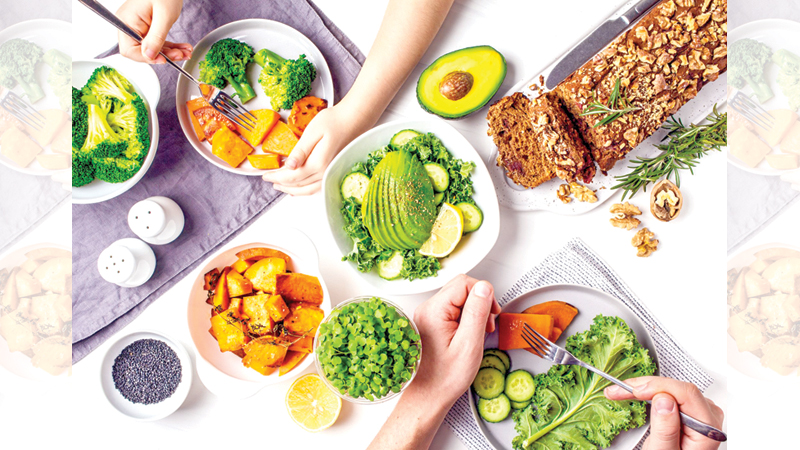 During this festive season, health officials are concerned that over indulgence of traditional sweetmeats served at this time around, especially to patients with heart diseases could worsen their already compromised immune systems.
During this festive season, health officials are concerned that over indulgence of traditional sweetmeats served at this time around, especially to patients with heart diseases could worsen their already compromised immune systems.
The Sunday Observer spoke to Consultant Cardiologist Teaching Hospital Kuliyapitiya, Dr. Wasantha Abeywickrama to find out how these negative fallouts could be reduced to ensure a heart-healthy life.
Q: During the new year season, families reunited and indulged in the rich, sugar, and oil-laden foods, putting their self-imposed or prescribed diets on hold. Do you see any adverse impacts when older persons with diabetes and cholesterol put their prescribed diets on hold for a few days just to enjoy the family meals like everyone else?
A. Yes. You may have heard of the “ABCs of diabetes.” This refers to three aspects of your health that should be well-controlled in order to manage your diabetes: A HBA1C (a blood test that measures your average blood sugar level over the past few months), Blood pressure, and Cholesterol. Having high sugar and cholesterol filled diets during the season even for a short period affects both the long term and the short term health of persons with lowered immune systems.
Q: So how can we help them enjoy the season while protecting their health?

Dr Wasantha K. Abeywickrama,
Consultant cardiologist, Teaching Hospital Kuliyapitiya
A. Many of us eat out more than usual over the new year period. And when we eat out, we often eat more than we would at home. Sticking to just one course once you see what everyone else is having is a good idea. Decide before you begin if you are going to have a starter or a dessert. If you don’t want to feel too stuffed, consider a starter (perhaps with a side order of vegetables), instead of a main course, or ask for a smaller portion. Family members can consider adding more heart friendly foods for the table.
Q: How do you measure the quantity that is safe to take?
A. Blood sugar control is closely related to the amount of food you eat, especially foods that contain carbohydrates as they have the biggest effect on your blood sugar. If your food portion contains more carbohydrate than your body is prepared to handle, your blood sugar goes up. Also, the extra calories will affect your weight, which will also affect your blood sugar by reducing your body’s resistance to insulin. That said, each person’s needs are different. The number of portions you need is based on your weight, gender and activity level. Your dietitian can advise you on the number of portions you should have at each meal and snack.
Q: What about fizzy drinks like ginger beer and coke which are popular drinks served at this time around?
A. Sweetened, sugary drinks can cause a sharp rise in blood sugar levels for people with diabetes or glucose intolerance (including prediabetes and gestational diabetes) and so it’s usually best to avoid drinking sugary drinks.
Q: Unsweetened local fruit drinks like guava juice? Mango juice? Papaya juice? Apple juice?grape juice? Which contain natural sugars – are they a better option?
A. I think home made fruit juices are much healthier than the beverages we see in the markets as long as we use minimal sugar and salt.
Q: The current thinking among most cardiologists is that of all these drinks, boiled cooled water is the best. Do you agree?
A. I agree.
Q: This is also the time when the more affluent families pull out their best bottles of wine. How safe is it to drink a glass of red wine or white wine when you are a diabetic or a person with a heart condition or high pressure and cholesterol?
A. There is some evidence that red wine might provide benefits to people with heart conditions, but stick to a small glass of red wine. Moderate red wine consumption is associated with increased HDL levels, the good cholesterol which helps to remove unhealthy cholesterol from your blood vessels. However, recent studies show that there is no safe limit for alcohol consumption.
Q: What about beer or stout?
A. They both contain a lot of carbohydrate than wine contains.
Q: So what are the kind of foods that should be avoided by those with compromised immune systems this New Year season? Should they be fried? Steamed? Cooked? Boiled?
A. Boil, steam, bake, or grill meats and vegetables. Don’t fry them. Fried foods are unhealthy because adding fat increases the calories and the high heat destroys a lot of the nutrients. Flavor foods with vegetable purée, lemon or lime juice, or herb seasonings. Don’t use cream-based sauces or sugary glazes.
Q: Steaming?
A. This is a healthy and simple option since the nutrients, colour and texture of fresh vegetables are better preserved as the food is not in contact with the water.
Q: Boiling?
A. Although this is a fat-free cooking method, nutrients, such as vitamin C and folate, are lost in the water. Using less water will help preserve the vitamins and minerals in your vegetables.
Q: Are there safe oils that could be used when cooking for people with compromised immune systems?
A. If you do use oil, choose olive, avocado, corn, peanut, sunflower, safflower, vegetable, or flaxseed oil.
Q: Smoking? Since most men are at home during the festive season they usually relax with a cigarette or pipe. Is this a good thing especially if they do so in a crowded room in the presence of non-smokers?
A. All smoke from burning nicotine products contains harmful chemicals (toxins). Even nonsmokers inhaling other people’s smoke breathe in these toxins. Side stream smoke from the end of a cigarette, cigar or pipe is unfiltered. It has more harmful toxins than mainstream smoke that someone breathes out.
Q: At this time around many children leading sedentary lives tend to overeat especially snacks, fried foods, biscuits, cake and sweets and drink a lot of artificially sweetened juice. Will this lead to early non Communicable diseases such as diabetes, heart problems, hypertension and cholesterol?
A. Yes, leading a sedentary lifestyle coupled with poor dietary habits, such as overeating snacks, fried foods, sugary treats, and artificially sweetened beverages, can significantly increase the risk of developing early non-communicable diseases (NCDs) such as diabetes, heart problems, hypertension, and high cholesterol. Consuming excessive snacks, fried foods, sugary treats, and beverages high in artificial sweeteners can lead to weight gain and obesity. Obesity is a major risk factor for various NCDs, including type 2 diabetes, heart disease, and hypertension. Sedentary Lifestyle contributes to weight gain, reduces cardiovascular fitness, and increases the risk of developing insulin resistance, which is a precursor to type 2 diabetes. It also contributes to poor circulation and can exacerbate heart problems and hypertension. Regular consumption of sugary snacks and beverages can lead to insulin resistance, weight gain, and ultimately, type 2 diabetes.
Q: Artificially sweetened beverages? Are they safer?
A. While artificially sweetened beverages may contain fewer calories, they have been associated with weight gain, metabolic syndrome, and cardiovascular issues. They can also disrupt appetite regulation, leading to increased calorie consumption from other sources.
Q: Do you have suggestions on how parents can motivate them into getting on the field and doing more outside activities?
A. Lead by Example: If parents are active and enjoy outdoor activities themselves, children are more likely to follow suit. Spend time outdoors as a family, whether it’s going for walks, bike rides, or playing sports together. Limit Screen Time: Set limits on screen time, including TV, video games, and smartphones, to encourage children to spend more time outdoors. Consider implementing a rule where outdoor playtime needs to happen before screen time.
Q: We are still in the midst of a Covid-19 outbreak and other infectious diseases. What are the likely adverse health impacts on those exposed to these risks?
A. Covid-19 is highly infectious and can easily spread from one person to another. When there are large celebrations or social gatherings the chances of the infection spreading are very high. Practising social distancing aids reduces possibilities for transmission of the virus.
The younger population is often unaware that they may be at risk and may fail to take the appropriate actions that could save their lives. Educating parents, adolescents, and young adults about the different risk factors is the best way to help prevent death and reduce problems associated with cardiac disease. In particular, childhood obesity has quickly become a global epidemic where 1 in 10 children are estimated to be overweight. Obesity can lead to precursors for CVD such as dyslipidemia (high cholesterol), hypertension (high blood pressure), type-2 diabetes, and metabolic syndrome. If these conditions are left unchecked, premature cardiovascular disease can occur, leading to significant health problems in young adults.
Q: Any Do’s and Don’ts on preventing or reducing risks of heart diseases during the new year?
A. Do’s: Choose Heart-Healthy Foods: Opt for dishes that are lower in saturated fats, cholesterol, and sodium. Include plenty of fruits, vegetables, whole grains, lean proteins, and healthy fats like those found in nuts, seeds, and fish.
Practise Portion Control: Enjoy festive foods in moderation and be mindful of portion sizes. Avoid overeating, especially high-calorie and high-fat dishes. Stay Active: to burn off extra calories.
Due to the present heat wave, it is also important to stay hydrated and drink plenty of water throughout the day, especially if consuming alcohol or salty foods.
Proper hydration supports overall heart health and helps regulate blood pressure. Prioritise restful sleep to support heart health and overall well-being. Aim for 7-9 hours of quality sleep per night.
Limit consumption of food high in unhealthy fats, sugars, and processed carbohydrates and avoid excessive intake of fried foods, sugary treats, and rich desserts. Stick to moderate drinking guidelines, which recommend up to one drink per day for women and up to two drinks per day for men.
Don’ts:
Ignore Symptoms: Pay attention to any warning signs or symptoms of heart problems, such as chest pain, shortness of breath, dizziness, or palpitations. Seek medical attention promptly if you experience any concerning symptoms.
Skip Routine Health Check-ups: Don’t neglect regular check-ups with your healthcare provider, especially if you have pre-existing risk factors for heart disease. Routine screenings and check-ups can help your heart health and detect any potential issues early on.
Q: Your message for all those celebrating the New Year?
A. If you follow these tips, you can enjoy the festive season while also taking care of your heart health






